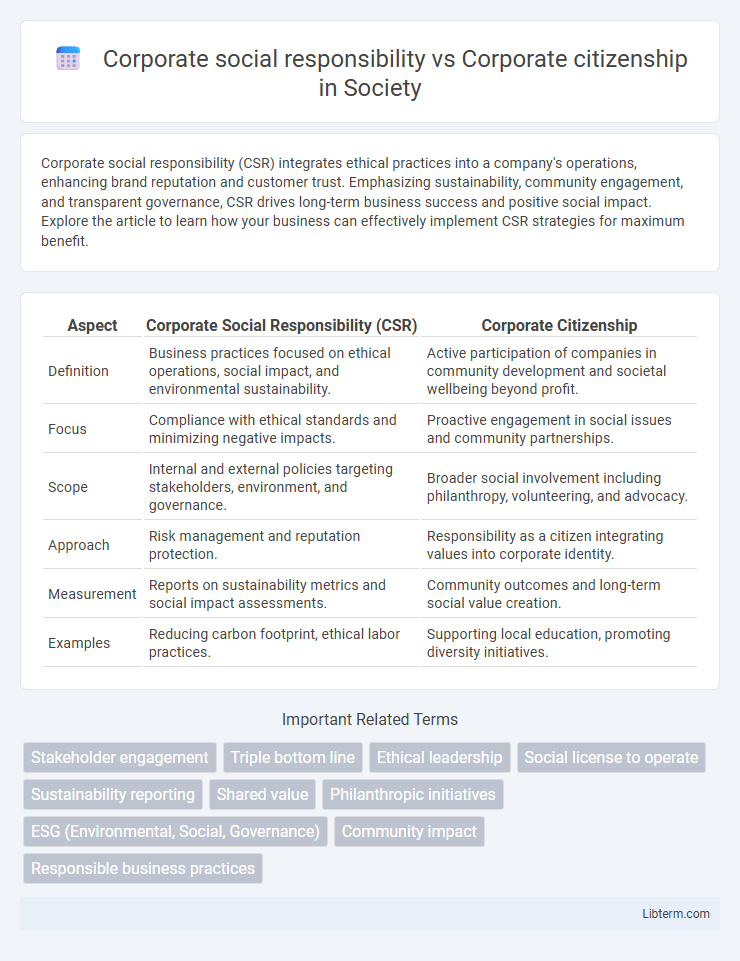Corporate social responsibility (CSR) integrates ethical practices into a company's operations, enhancing brand reputation and customer trust. Emphasizing sustainability, community engagement, and transparent governance, CSR drives long-term business success and positive social impact. Explore the article to learn how your business can effectively implement CSR strategies for maximum benefit.
Table of Comparison
| Aspect | Corporate Social Responsibility (CSR) | Corporate Citizenship |
|---|---|---|
| Definition | Business practices focused on ethical operations, social impact, and environmental sustainability. | Active participation of companies in community development and societal wellbeing beyond profit. |
| Focus | Compliance with ethical standards and minimizing negative impacts. | Proactive engagement in social issues and community partnerships. |
| Scope | Internal and external policies targeting stakeholders, environment, and governance. | Broader social involvement including philanthropy, volunteering, and advocacy. |
| Approach | Risk management and reputation protection. | Responsibility as a citizen integrating values into corporate identity. |
| Measurement | Reports on sustainability metrics and social impact assessments. | Community outcomes and long-term social value creation. |
| Examples | Reducing carbon footprint, ethical labor practices. | Supporting local education, promoting diversity initiatives. |
Understanding Corporate Social Responsibility (CSR)
Corporate Social Responsibility (CSR) refers to a company's commitment to ethical practices, environmental sustainability, and positive social impact, integrating these principles into core business strategies. Unlike Corporate Citizenship, which emphasizes a company's role as a community member through philanthropy and local engagement, CSR encompasses a broader framework that includes stakeholder accountability, regulatory compliance, and long-term value creation. Understanding CSR involves recognizing its strategic importance in risk management, brand reputation, and fostering sustainable development aligned with global standards such as the UN Global Compact and ISO 26000.
Defining Corporate Citizenship
Corporate citizenship refers to a company's role and responsibilities as a member of society, emphasizing ethical behavior, community engagement, and sustainable practices that go beyond profitability. It integrates social, environmental, and economic considerations into business operations to create long-term value for stakeholders and society. Unlike corporate social responsibility (CSR), which often focuses on specific programs or compliance, corporate citizenship represents a holistic approach to embedding social responsibility into the company's core values and strategy.
Key Similarities Between CSR and Corporate Citizenship
Corporate social responsibility (CSR) and corporate citizenship both emphasize a company's commitment to ethical behavior, social impact, and sustainable development within its operational framework. Both concepts prioritize stakeholder engagement, environmental stewardship, and community involvement as central components of responsible business practices. The shared goal is to integrate social and environmental concerns into corporate strategy to enhance long-term value for society and the business itself.
Major Differences: CSR vs Corporate Citizenship
Corporate Social Responsibility (CSR) primarily focuses on a company's ethical obligations and risk management in relation to environmental, social, and economic impacts. Corporate Citizenship goes beyond CSR by emphasizing active engagement and collaboration with communities to create long-term value and foster sustainable development. While CSR is often compliance-driven, Corporate Citizenship centers on proactive partnerships and shared responsibility for societal well-being.
Historical Evolution of CSR and Corporate Citizenship
Corporate social responsibility (CSR) emerged in the 1950s, focusing on ethical business practices and stakeholder accountability, evolving from philanthropic activities to strategic integration into corporate governance. Corporate citizenship developed later in the 1990s, emphasizing the corporation's role as a societal member with responsibilities beyond profit, including social and environmental stewardship. The historical evolution reflects a shift from compliance-driven CSR to proactive corporate citizenship, highlighting deeper community engagement and sustainable development commitments.
Strategic Importance for Modern Businesses
Corporate social responsibility (CSR) emphasizes a company's ethical obligations and risk management in addressing social and environmental issues, enhancing reputation and stakeholder trust. Corporate citizenship extends CSR by embedding social values into core business strategies, driving sustainable development and long-term competitive advantage. Both concepts are strategically important for modern businesses to align profitability with societal impact and regulatory compliance.
Measuring Impact: Metrics and Benchmarks
Measuring impact in Corporate Social Responsibility (CSR) involves specific metrics such as carbon footprint reduction, community investment returns, and employee well-being indices, which provide quantifiable data on sustainability efforts. Corporate citizenship emphasizes broader benchmarks, including stakeholder engagement levels, ethical governance practices, and contributions to local economic development, reflecting an organization's holistic role in society. Both frameworks require transparent reporting standards like the Global Reporting Initiative (GRI) and Sustainability Accounting Standards Board (SASB) to effectively compare outcomes and drive continuous improvement.
Stakeholder Engagement Approaches
Corporate social responsibility (CSR) emphasizes stakeholder engagement through compliance-driven initiatives and philanthropy to address community concerns and regulatory expectations. In contrast, corporate citizenship incorporates a strategic approach that integrates stakeholder collaboration into core business operations, promoting shared value creation and long-term sustainability. Both models prioritize transparency and dialogue but differ in the depth of stakeholder integration within corporate governance and decision-making processes.
Global Trends Shaping CSR and Corporate Citizenship
Corporate social responsibility (CSR) and corporate citizenship increasingly align with global sustainability goals, emphasizing environmental stewardship and social equity in business operations. Trends such as the adoption of ESG (Environmental, Social, Governance) criteria, stakeholder capitalism, and the integration of the United Nations Sustainable Development Goals drive corporations to enhance transparency and accountability in their social and environmental impacts. Multinational companies leverage digital reporting tools and global collaborations to meet evolving regulatory standards and stakeholder expectations in both CSR and corporate citizenship.
Future Outlook: Integrating CSR and Corporate Citizenship
The future outlook for integrating Corporate Social Responsibility (CSR) and Corporate Citizenship emphasizes a holistic approach where businesses actively engage in sustainable development, community well-being, and ethical governance. Companies increasingly prioritize transparent reporting, stakeholder collaboration, and long-term environmental and social impact to build resilient, purpose-driven brands. This integration fosters innovative strategies that align business goals with global sustainability frameworks like the UN Sustainable Development Goals (SDGs), shaping corporate accountability and positive societal change.
Corporate social responsibility Infographic

 libterm.com
libterm.com